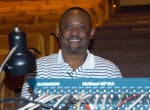The Long Term Ecological Research (LTER) Network’s recently concluded All Scientists Meeting (ASM) continues to receive praise from participants as one of the best organized ever (see, for example, http://bit.ly/YjTgex and http://bit.ly/SfovEf). The triennial meeting, which this year was held September 10-13, 2012, at the YMCA of the Rockies in Estes Park, Colorado, brought together over 750 scientists and students. Attendees, including U.S. and international scientists, were treated to four days of vigorous discussions, including seven plenary talks, more than 80 scheduled and impromptu working groups, and more than 400 scientific posters.
Meeting theme
The 2012 ASM’s theme, “The Unique Role of the LTER Network in the Anthropocene: Collaborative Science Across Scales,” reflected the increasing importance of long term ecological research in providing answers and solutions to some of the world’s most challenging problems, such as climate change, which threaten not only the earth’s environment, but also humanity’s social and economic fabric. The LTER Network’s 26 sites conduct research in some of the world’s most important ecosystems and are, therefore, uniquely positioned to observe and document changes to these ecosystems caused by human activities. LTER sites not only observe these interactions, but are also experimenting, modeling, and simulating likely future scenarios as human activity increases and accelerates.
Plenary talks
The ASM included seven invited plenary speakers, all of them leading lights in their fields of specialization, to share their views and approaches with their LTER colleagues. The presentations were uniformly interesting, informative, and occasionally provocative. All presentations were videotaped so those of you who couldn’t be present can share in the experience (see bit.ly/SeXqB0). The presenters included:
- John Wingfield, Assistant Director for Biological Sciences at the National Science Foundation (Vision of a Strategic Innovation for Biological Sciences)
- Erle C. Ellis (Ecology in the Anthropocene: Observing, Understanding, and Embracing Human Nature)
- Robert Kates (Does LTER All Science include Sustainability Science?)
- Steve Lansing (The Balinese Would Like a Word: Implications of Alternate Steady States in Lakes and Rice Paddies)
- Michael P. Nelson (The Value of, and Challenges for Long Term Ecological Research)
- Elizabeth Borer (Emergent properties of cooperative science: the whole is greater than the sum of its parts)
- Luis Amaral (From the three Rs to the three Cs: Complexity, Creativity, Collaboration)
Please click on the titles to be directed to the short biographies of the presenters and brief summaries of their talks, videos of which are also available at bit.ly/SeXqB0.
Working groups
The working group sessions provided a forum for multidisciplinary teams of scientists to come together, dig deeper into the various challenging topics, and brainstorm possible approaches and solutions. According to Robert B. Waide, the Executive Director of the LTER Network Office, which is based at UNM in Albuquerque, NM, "Working group discussions help formulate new ideas and guide LTER research in new directions, as well as build long-term collaborations." During the 2012 LTER ASM Working Group wrap up session at the end of the meeting, organizers and team leaders presented brief overviews and results of their working group meetings to the assembled plenary audience of scientists and students. Reports from these working groups will are posted on the ASM 2012 working group pages (http://asm2012.lternet.edu/working-groups) as they come in.
ASM Socials
After a full day of challenging discussions in working groups and listening to plenary talks, ASM participants took time off in the evenings to attend the poster presentations and interact in the much more relaxed atmosphere of a mixer social. Unlike the structured setting of the working groups, the mixers provided scientists and students the chance to interact one on one and hold deeper discussions without being constrained by time and place. Evening mixers took place in the Assembly Hall, where participants could study posters on LTER research, admire art from different LTER sites, get the latest update on the Network Information System, or just share ideas with colleagues over a beer.
Next steps
The meeting ended with music and dancing, and by the end of the evening almost everyone had made it out to the dance floor. The ideas generated by interactions at the ASM will lead to proposals and publications, which we will feature as they appear. Proposals for working groups, post-doctoral projects, and training activities are already coming in, and we look forward to seeing the results of these efforts.
By McOwiti O. Thomas (LNO)


 Enlarge this image
Enlarge this image
